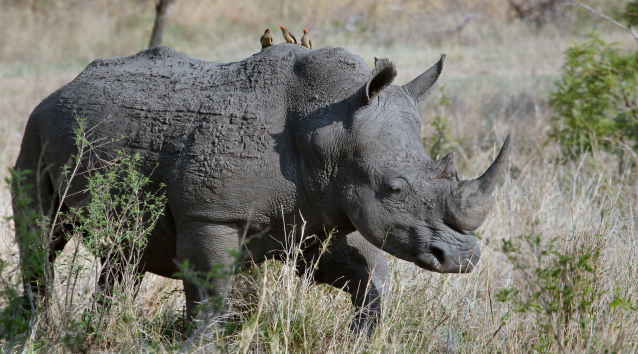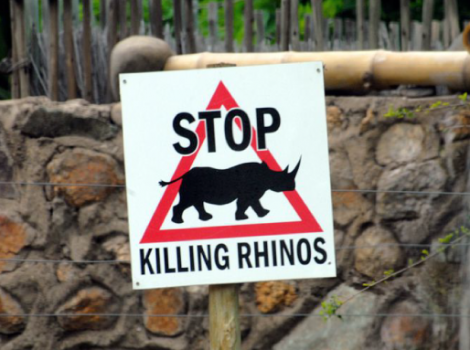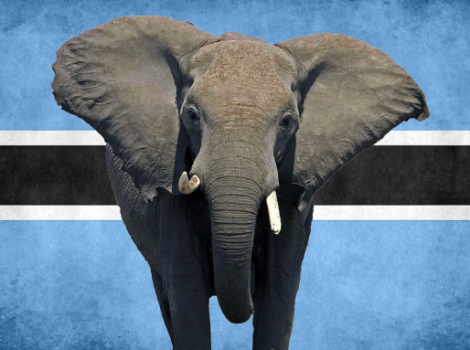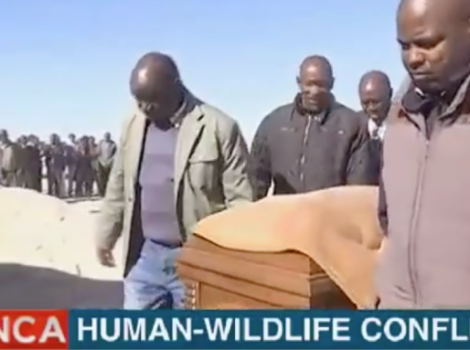
Botswana has begun dehorning its wild rhinoceros population in a bid to save them from poachers. Botswana wildlife officials say poachers killed 56 rhinos in the last two years for their horns, which fetch a high price on Asian markets. Since April, Botswana has been relocating its critically endangered black rhinos to a secret location. The country’s acting director of Wildlife and National Parks, Cyril Taolo, says at least 56 rhinos have been poached in the last two years.
As a result, Botswana has decided to dehorn and translocate all the rhinos in the vast Okavango Delta to a safer, secret location. Both the white and black rhino have been targeted by poachers in the recent past. Conservationists warn the black rhino might be extinct by next year if the current rate of poaching is anything to go by.
“A decision was taken to implement measures to protect our rhinos to enable us to combat their poaching,” Taolo said.
Some of the rhinos were relocated from neighbouring South Africa in 2015, with Botswana considered a safer haven. It is unclear how many rhinos are in Botswana. Principal Veterinary Officer, Mmadi Reuben said the dehorning process is not painful to the rhinoceros.
“Dehorning of rhinos does not hurt the animal. It’s a procedure that is equivalent to cutting nails in the perspective of humans,” Reuben said.
“What we do is preserve the growth plate of the horn and cut the horn where there is actually dead material. In other words, there is no sensitivity in the area that we are cutting and there is no blood supply within that area.”
Renowned Conservationist, Neil Fitt said while it would be ideal to have the animals in their natural habitat, circumstances in Botswana call for a change of approach.
“The poachers are really, really hammering us. So what the government has decided to do, which several other governments have decided to do in the area, is the dehorning policy to discourage poachers,” Fitt said.
“Probably as a short term, I hope it is a short term, yes I would support 100% what they are doing.”
Botswana is battling a rise in poaching incidents, with nearly 20 poachers killed in fire exchanges with local soldiers in the last year.
Meantime, the relocation of wildebeests is also underway
The government has captured 76 wildebeests at Sekhutlane farms to be translocated to the Kalahari Trans-frontier Park (KTP) and the Botswana Defence Force Thebephatshwa Park.
This is part of an ongoing operation which began last month aimed at preventing contact between wildebeests and cattle. Such contact had led to the spread of malignant catarrhal fever (MCF) among the cattle.
The move is in response to the pleas of local farmers, who expressed displeasure over the loss of cattle, citing the transmission of MCF by wildebeests in the Gasita, Lerolwane, Sekhutlane area. In a recent interview, the Principal Veterinary Officer in the Ministry of Environment Natural Resources Conservation and Tourism, Dr Mmolotsi Dikolobe said the exercise was designed to ensure ecological integrity. He indicated that out of the 76 wildebeests, 30 would be taken to Thebephatshwa, while the rest would be taken to KTP.
This, Dr Dikolobe said, brings to 473, the total number of wildebeests that have been translocated, adding that some were transported to Central Kalahari Game Reserve. He acknowledged that the number reflected notable success. He said as MCF is untreatable, the most efficient control measure was to separate the carrier (wildebeests) from the cattle. Dr Dikolobe noted they were still considering culling some of the wildebeests and auctioning the meat to the nearby villages for public consumption.
Source: http://www.voanews.com/africa/poaching-forces-botswana-dehorn-translocate-rhinos / http://www.dailynews.gov.bw/news-details.php?nid=56745



